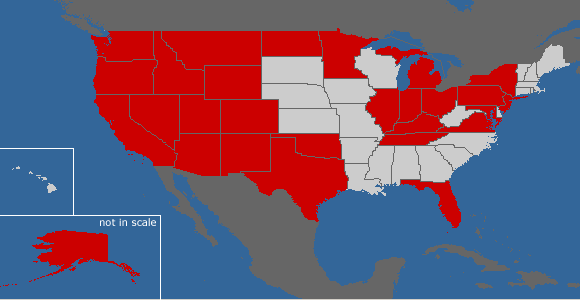Media Info
News releases
Fact sheets
Interview us
Myths & truth
Gun dictionary
Scary words
SEA Effects
FAQ
Home
Shirts, hats, stuff
Join News List
Privacy
Policy
Fact Sheets
People | Explosives | Guns
![]()
People
Organizer: The Boomershoot is organized and run by Joe Huffman, Director. For a more detailed profile on Joe’s background, along with bios of other Boomershoot specialists, please see the Media Specialists sheet.
Shooters: About 130 participants (up to the minute stats are here) and dozens of spectators are expected to attend the Boomershoot this year. Along with countries of Canada, UK, and India, the states in red below reflect where shooters have come from over the years including the people signed up for Boomershoot 2012.

Backgrounds: Shooters come from all walks of life, including law
enforcement officers, scientists, engineers, software developers, and members of
the Boeing Pistol & Rifle Club. Others are gun rights activists such as
Stephanie Sailor, three-time Illinois U.S. Congressional candidate
(Independent), known for running cyber campaigns on a $0 budget.
More: Chicago
Reader October 15, 2004
![]()
Explosives
Our recipe: The explosives we use are a mixture of ammonium nitrate (a fertilizer), potassium chlorate (used in making matches), and ethylene glycol (common automobile antifreeze).
For more on how our explosives work, please visit
here.
For more on our explosives experiments, please visit
here.
Purpose of our formula: The design goals for this explosive were safety, reliable detonation from rifle fire, a satisfying reaction from shooters, environmentally friendliness, and price.
Containers: Cardboard boxes of 4" and 7 3/8" square are used to hold the explosives.
Storage: The explosives are stored in a Federal Bureau of Alcohol, Firearms,
Tobacco, and Explosives approved and inspected storage magazine.
The
magazine is theft and bullet resistant.
What you actually see during an explosion: The “smoke” you see from
Boomershoot explosives is actually not smoke. The explosion byproducts are water vapor, nitrogen (80% of fresh air is nitrogen), carbon dioxide (again, a component of normal air), oxygen, and a couple ounces of
the salt potassium chloride. Sometimes dust and dirt is also thrown into the
air.
The fireball explosions do produce true smoke composed of unburned
hydrocarbons (gasoline).
How much: In 2012, we expect to detonate
over 1600 targets containing over 1700 pounds of high explosives.
In the past: At the first public event in '99 there were 130 targets, amounting to about 65 pounds of high explosives.
Force: The explosions can be heard over seven miles away. Cars and houses
will shake up to two miles from the range.
—Back to top—
![]()
Guns
Types of firearms: Primarily hunting rifles with telescopic
sights.
Price of guns: Vary from $100 to $10,000.
Average price of gun, ammo, and accessories: $1000.
Bullet sizes: Somewhere between 0.22 inches to 0.50 inches in diameter
weighing between 50 and 700 grains.
Most commonly used caliber at our shoot: 30 caliber (shoots a bullet that is approximately 0.30 inches in diameter). Of the 30 caliber cartridges, 308 Winchester and 300 Winchester Magnum will probably be the most represented.
—Back to top—
![]()
Email: Joe Huffman
Last updated:
March 07, 2012